Team Katniss: Collaborative Success in The Hunger Games
Humans are by nature a social animal, Aristotle famously wrote over two millennia ago. The exponential growth of social networks on the internet in recent years is only the latest example of how that defining feature of human nature has endured across a hundred generations of political and technological change. Our interconnectedness and interdependence – whether among family and friends, in our city or nation, or within the global community – often gives us the strength, courage, or resources to succeed at something we could never accomplish alone. Or, in the cliché of sports and business, the team is greater than the sum of its parts.
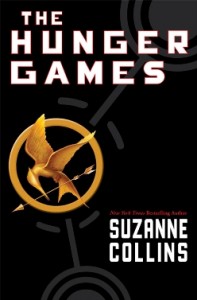 Yet when we look at the fictional stories we tell each other about heroes, we often see tales emphasizing a single champion’s individual triumph or tragedy. Luke Skywalker stands alone facing down Darth Vader and the Emperor. John Wayne or Clint Eastwood fight as the lone cowboy or sheriff. Not to mention all of the lone action heroes played by Sylvester Stallone, Chuck Norris, Steven Segall, or Bruce Willis, to name just a few. In both film and comics, superheroes frequently save the day alone, too.
Yet when we look at the fictional stories we tell each other about heroes, we often see tales emphasizing a single champion’s individual triumph or tragedy. Luke Skywalker stands alone facing down Darth Vader and the Emperor. John Wayne or Clint Eastwood fight as the lone cowboy or sheriff. Not to mention all of the lone action heroes played by Sylvester Stallone, Chuck Norris, Steven Segall, or Bruce Willis, to name just a few. In both film and comics, superheroes frequently save the day alone, too.
Many of these heroes, of course, have a sidekick, a girlfriend or supporting allies. Luke Skywalker gets assists from his friends – no exhaust port shot without Han knocking off Darth Vader’s pursuit, and no rescue from Cloud City without Leia’s insistence to Lando, for example – but his adventures are not structured as team victories. Indiana Jones counts on Sallah, Short Round, and his father, among others. Neo has Morpheus and Trinity; Frodo has the Fellowship. Superman or Spiderman may gain help at times from a superhero friend or ordinary ally, but Christopher Nolan’s highly popular current incarnation of Batman doesn’t even have a Robin.
The examples of true teamwork are the exception. The most prominent recent example is probably Harry Potter, whose adventures and success are inseparable from his reliance on Hermione and Ron especially, and a broader group of mentor and friends, as well. Even in The Deathly Hallows, as the final solo showdown with Voldermort approaches, Harry’s teamwork with his friends is an inextricable part of how he sets up and executes his victory. Similarly, Buffy the Vampire Slayer is the story of the triumphs and travails of the Scooby Gang, who win or lose together. Although Buffy is the only one of them born with the legacy of a Slayer and consequently must be the central element of the anti-monster team, she could never have achieved what she did without the Gang’s support, and many of her plans specifically count on the participation and special skills of her teammates.
In The Hunger Games novel trilogy, Suzanne Collins created another fantastic example of an heroic story centered around one principal character, without losing touch with the role that teamwork and collaborative success play in human nature. In a very real sense, the trilogy is not the story of the rise and triumph of Katniss Everdeen, but rather the success of Team Katniss.
In the first book, The Hunger Games, Collins showcases Katniss’ reliance on teamwork and collaboration from the very start. Before the Reaping, her only goal in life is to keep her family fed, housed, and safe. But she doesn’t try to do this with some string of impressive personal accomplishments. Instead, she pairs with Gale to hunt, builds relationships in the Hob to trade for things she can’t acquire or create herself, and barters in-kind exchanges for her mother’s healing skill or her hunt’s bounty. Without knowing it, Katniss has built for herself a set of skills and values that will provide her with the path to winning the Games.
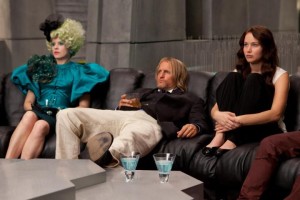 After she volunteers, Katniss’ goal immediately becomes to win – not for personal glory, but because she fears for her family’s fate if she never returns. Again, she doesn’t try to figure out by herself how to win the Games; instead, she works collaboratively with the people in the best position to help her. Even on the train ride to the Capitol, she is already learning from Haymitch and Effie about strategies for the Games. She expands her team further upon reaching the Capitol, most importantly with Cinna’s contributions and pairing with Peeta to debrief options and competitors. At the same time, Katniss draws upon her experiences in District 12 in exercising great care in deciding whom she can trust. She knows that not everyone who appears to be a friend is one, and that betrayal is potentially always just around the next corner. It is this eye for reading people, for discerning trustworthiness and compassion from manipulation, that allows her to avoid a fatal misstep in choosing her allies. Even when she is skeptical that Peeta’s televised declaration of love might just be a ploy for the audience, she also has a strong enough read on his nature as a person to know that it is not a trap meant only to disrupt her own focus – and that his feelings might even be true.
After she volunteers, Katniss’ goal immediately becomes to win – not for personal glory, but because she fears for her family’s fate if she never returns. Again, she doesn’t try to figure out by herself how to win the Games; instead, she works collaboratively with the people in the best position to help her. Even on the train ride to the Capitol, she is already learning from Haymitch and Effie about strategies for the Games. She expands her team further upon reaching the Capitol, most importantly with Cinna’s contributions and pairing with Peeta to debrief options and competitors. At the same time, Katniss draws upon her experiences in District 12 in exercising great care in deciding whom she can trust. She knows that not everyone who appears to be a friend is one, and that betrayal is potentially always just around the next corner. It is this eye for reading people, for discerning trustworthiness and compassion from manipulation, that allows her to avoid a fatal misstep in choosing her allies. Even when she is skeptical that Peeta’s televised declaration of love might just be a ploy for the audience, she also has a strong enough read on his nature as a person to know that it is not a trap meant only to disrupt her own focus – and that his feelings might even be true.
 Once the Games begin, Katniss plays out her talent for teamwork and collaboration into a victory. Within the arena, she knows better than to even try to ally with the Career Pack or other tributes she can’t trust. Still, that doesn’t make her unwilling to acknowledge a temporary agreement for mutual survival, as with Thresh, when the alternative is mutual death. Her only real teammates in her plan to survive, though, are Rue, whose vulnerability and genuineness reminds Katniss of Prim, and then Peeta, with whom Katniss had spent enough time to build a bond of trust. Beyond the arena, Katniss also relies on her team, especially the gifts arranged by Haymitch. Although they cannot speak or directly communicate, Katniss and her mentor have grown familiar enough that they are able to anticipate each other’s thoughts and reactions to successfully coordinate the assistance she needs to win.
Once the Games begin, Katniss plays out her talent for teamwork and collaboration into a victory. Within the arena, she knows better than to even try to ally with the Career Pack or other tributes she can’t trust. Still, that doesn’t make her unwilling to acknowledge a temporary agreement for mutual survival, as with Thresh, when the alternative is mutual death. Her only real teammates in her plan to survive, though, are Rue, whose vulnerability and genuineness reminds Katniss of Prim, and then Peeta, with whom Katniss had spent enough time to build a bond of trust. Beyond the arena, Katniss also relies on her team, especially the gifts arranged by Haymitch. Although they cannot speak or directly communicate, Katniss and her mentor have grown familiar enough that they are able to anticipate each other’s thoughts and reactions to successfully coordinate the assistance she needs to win.
In her final moment of triumph, when the Gamemakers snatch away the promised chance for a dual win, Katniss refuses to abandon her friend. Vulnerable as he was, she could have finished off Peeta, claimed the victory, and saved herself. Instead, she insisted that she win with him or not at all. In her defiance, Katniss turned an individual game into a team game – and sealed the victory not just for Katniss Everdeen, but for Team Katniss.
The remaining two books of the trilogy continue this theme all the way until Katniss’ last act of defiance against tyranny. In Catching Fire, Katniss first must again count on Peeta during their tour of Panem to ensure that Snow is satisfied that they are acting sufficiently in love. 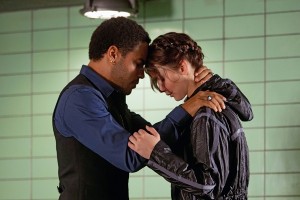 Then, when the Quarter Quell Games begin, she quickly forms a new team, including Finnick, Johanna, and Beetee among others. Working collaboratively, the group manages to evade many of the arena’s threats and ultimately breaks through the forcefield, enabling their rescue by the rebels from District 13. As the revolution builds in Mockingjay, Katniss becomes the face of the rebellion and, at times, a tool of its leaders, who are serving their own agenda, not hers. Although the progress of the war leads to differences of perspective with Gale, and Peeta cannot be a reliable ally as he struggles to overcome his poisoning and brainwashing, these difficulties do not cause Katniss to change who she is. Her assault mission in the Capitol once again depends heavily on her teammates for the plan to succeed. And it is her bond of trust with Haymitch, their unspoken thought process on the same wavelength, that gives her the confidence to cast the fateful vote for Coin’s proposed new Games, knowing that Haymitch will understand. He does, and their mutual trust enables Katniss to be in position to prevent Snow’s tyranny from simply being replaced with Coin’s. Without her teammates, Katniss’ final victory would not have been possible.
Then, when the Quarter Quell Games begin, she quickly forms a new team, including Finnick, Johanna, and Beetee among others. Working collaboratively, the group manages to evade many of the arena’s threats and ultimately breaks through the forcefield, enabling their rescue by the rebels from District 13. As the revolution builds in Mockingjay, Katniss becomes the face of the rebellion and, at times, a tool of its leaders, who are serving their own agenda, not hers. Although the progress of the war leads to differences of perspective with Gale, and Peeta cannot be a reliable ally as he struggles to overcome his poisoning and brainwashing, these difficulties do not cause Katniss to change who she is. Her assault mission in the Capitol once again depends heavily on her teammates for the plan to succeed. And it is her bond of trust with Haymitch, their unspoken thought process on the same wavelength, that gives her the confidence to cast the fateful vote for Coin’s proposed new Games, knowing that Haymitch will understand. He does, and their mutual trust enables Katniss to be in position to prevent Snow’s tyranny from simply being replaced with Coin’s. Without her teammates, Katniss’ final victory would not have been possible.
With the success of Harry Potter and The Hunger Games, perhaps we’ll begin to see more heroic stories featuring teamwork and collaborative success as a critical part of the main character’s story. In an upcoming post in our Heroine’s Journey series, we’ll discuss more about why we think these elements are particularly powerful in stories centered around strong female heroines like Katniss and Buffy.
Using the term Team Katniss in this post is, of course, not the common meaning of “Team” in contemporary pop culture. It usually refers to fans identifying with one option or the other in a romantic storyline, usually a love triangle – most famously (or notoriously) the Twilight series’ Team Edward and Team Jacob. While this phenomenon can certainly generate fan enthusiasm, it is not without its downsides. Last week, Racheal Ambrose wrote a great post, It’s Time to Say Goodbye to Teams, at her blog discussing several of them.
In the spirit of Tricia’s Where’s Team Bella? post last fall here at FANgirl Blog, and the awesome and outspoken geek girl role models of Team Unicorn, the term Team Katniss in this post is an intentional usage in a different direction – to put the focus back on the central female character, and emphasize that some fans actually support her character and her heroic success as the most important elements in the story. Interestingly, as we were finishing up the final draft of this post earlier in the week, we noticed that Michael Slezak of TVLine began his recap of Monday’s episode of the new NBC Broadway-centered series Smash by talking about the professional rivalry between the two young ladies vying for the lead in Marilyn: The Musical in terms of Team Ivy and Team Karen. Maybe this whole “Team [Heroine] Not Team [Boyfriend]” thing might have some legs after all…
B.J. Priester is editor of FANgirl Blog and contributes reviews and posts on a range of topics. A longtime Star Wars fandom collaborator with Tricia, he is also editing her upcoming novel Wynde. He is a law professor in Florida and a proud geek dad.

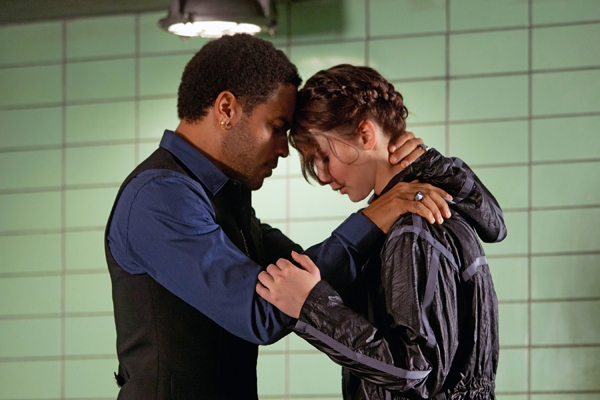







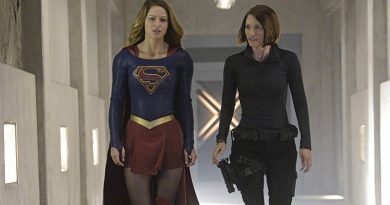


Stories that involve a team, even if it’s a small one are much easier to relate too – than one where all the accomplishments comes from one person alone.
Pingback:Journey of a Strong Female Heroine: Katniss Everdeen « fangirlblog.com
Pingback:Star Wars, The Hunger Games, and the Storytelling Power of Thematic Resonance « fangirlblog.com
Pingback:The Heroine’s Journey: How Campbell’s Model Doesn’t Fit « fangirlblog.com
This is an epic, awesome piece! Glad to see someone else is thinking the same way I do. You’ve obviously put a lot of thought into this to have so many examples. You left out Toy Story though :) I think it’s worthy of a mention.
Pingback:Excerpts – honestly,